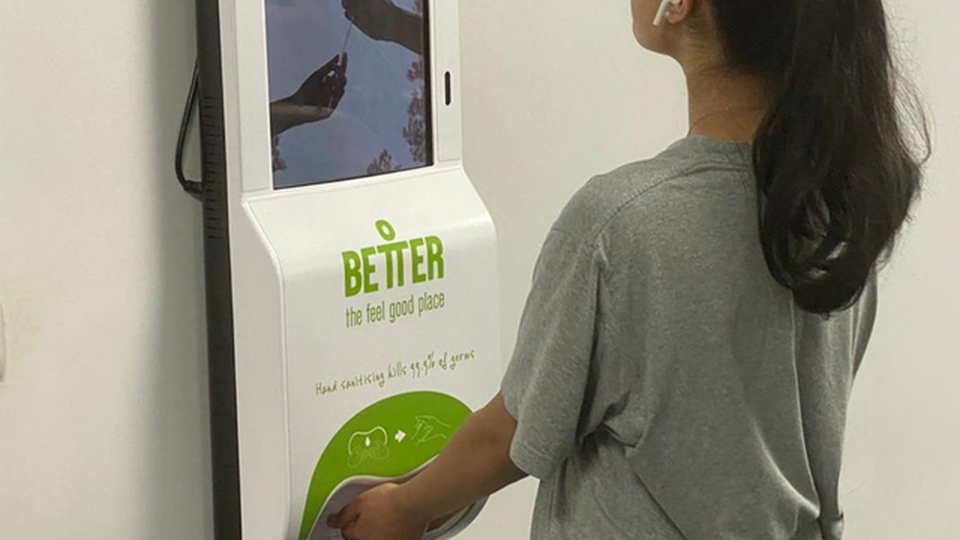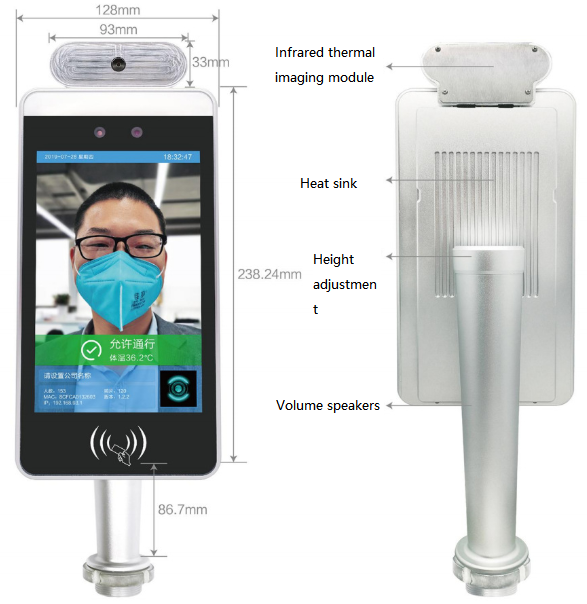Article
Coronavirus jumpstarts self-service innovation worldwide
The coronavirus has driven self-service technology entrepreneurs to use technology to allow consumers to order and pay for everyday needs without having to go near another human being.

March 25, 2020 by Elliot Maras — Editor, Kiosk Marketplace & Vending Times
With consumers hunkering down to escape the coronavirus, unattended retail has gained a powerful second wind. And not just Amazon.
Self-service technology entrepreneurs are using artificial intelligence, face recognition and infrared technology to allow consumers to order and pay for everyday needs without having to go near another human being.
And with bottled water, sanitizers and toilet paper in short supply, entrepreneurs worldwide are also introducing a new generation of unattended "category killers."
 |
| Cali Group's face and temperature recognition kiosk can help locations reduce exposure to COVID-19. |
Cali Group takes the lead
Cali Group, a technology solutions provider that owns Miso Robotics, a robotics maker, and a chain of 50 fast casual burger joints called Caliburger, recently announced plans to deploy temperature and face recognition technology in CaliBurger restaurants to fight the spread of COVID-19. These technologies and systems will initially be implemented in a CaliBurger store in Pasadena, California in the coming weeks, according to a company release.
When the store opens for takeout and delivery, devices attached to the doors will measure the body temperatures of staff and guests. If the sensor detects a person has a fever, they will not be permitted into the restaurant. All visitors will have their faces scanned.
When the store is not open for delivery and takeout, staff will use the face recognition system the same time the temperature scan is working to unlock the door in a single step, rather than having to do the temperature scan and then having to use a key card as a second step.
Customers who want to pay on site will register at popid.com to use the PopPay face pay service, allowing them to pay without touching a panel. They will also be able to order and pay using PopPay on the CaliBurger web site.
Cali Group is not alone. Following are some other self-service innovators meeting today's sanitization consciousness.
NoviSign Ltd.
NoviSign Ltd., a Tel Aviv based digital signage software company, has introduced a sanitation kiosk that can dispense gel, foam or liquid sanitizer. The kiosk, which can be freestanding or wall-mounted, has a 21.5-inch display screen that runs on NoviSign's cloud-based digital signage software.
The kiosk has an internal automatic dispenser system, a built-in drip tray, a sanitizer refill compartment and a built-in Android media player. The digital screen can be a touchscreen or non-touchscreen. The unit supports Wi-Fi, hard wire or a 3G or 4G connection to the Internet.
NoviSign's cloud based digital signage software allows content editing. The kiosk operator can insert live RSS feeds, websites, slide shows, news, social media feeds, videos, scrolling tickers and HD images using drag-and-drop widgets.
"Upon walking up to the kiosk, users can receive hand sanitizer while seeing any combination of information and media being displayed on the kiosk's screen," Chad Bogan, director of sales and marketing, said in a press release.
The display can show hand washing techniques, health tips and best practices.
NovoSign currently has more than 500 units deployed in Europe in medical clinics, health clubs, gyms, dental offices and malls.
Senda Electronics Group
 |
| Senda's thermometer kiosk with face recognition reduces exposure to COVID-19. |
Senda Electronics Group Company Ltd., a kiosk manufacturer in Shenzen, China, has developed a kiosk with an infrared thermometer to detect body temperature designed to allow locations to reduce exposure to COVID-19, according to an email. The height adjustable kiosk — which can be wall mounted or freestanding — also has a face recognition camera, speakers and a 7-inch display screen.
Senda Electronics also introduced a kiosk to dispense safety masks. The customer can pay by mobile phone using the QR scanner for installations in China. Additional payment interfaces are needed for kiosks in other countries. The kiosk has a display screen which the company can customize to include a touchscreen.
Vendekin Technologies
Vendekin Technologies, a Pune, India based start-up, introduced a machine to dispense hand sanitizers and other hygiene products, according to a Financial Express report. Vendekin provides the technology while Instor India, a manufacturer and exporter of retail fixtures, provides the hardware.
Aroon Khatter, founder and CEO, said the Vendekin has been inundated with orders for the machine. The company will provide 100 machines immediately and 500 more in the near future. The company had been installing sanitary pad vending machines called HygieneVend, but following the coronavirus outbreak, has converted these into hand sanitizer vending machines.
The brand agnostic machine can hold 50 bottles of 60 ml sanitizer.
Topow
Face mask vending machines designed by Topow, a technology company specializing in virtual reality products, were installed in Xuzhou, Jiangsu Province of eastern China that allow a customer to buy one pack of two masks per every 24-hour period, according to a Daily Mail report. Customers are required to have their IDs scanned and can pay using WeChat or Alipay. The packs cost 12 yuan.
Topow also plans to launch a vending machine that can check peoples' temperatures after scanning their ID, according to CEO Liu Ke.
Elektral
Elektral, a Turkish company, has developed a vending machine to sell protective masks, wipes and disinfectants in public places, according to a Hurriyet Daily News report.
Erdem Dincsoy, who heads the company, said the machine will help curb the spread of the coronavirus and will be placed at subway stations and airports in Istanbul.
Tawian offers free sanitizer
Two cities in Taiwan recently installed vending machines that dispense free bottles of isopropanol hand sanitizer to fight the coronavirus, according to a Taiwan News report.
Residents were told to pick up one free bottle apiece by presenting their IDs. The machines in Kaohsiung's Luzhu District and Tainan's Xinshi District have been programmed to dispense one bottle per customer.
A total of 500 bottles will be available 24/7, following a similar project to distribute face masks.
Poking fun at hoarders
The owners of two U.K. amusement parks have replaced the plush toys in the crane machines with toilet paper and hand sanitizers, according to an ABC TV News report. The intent was to ridicule hoarders rather than capitalize on bathroom sanitation.
Rob Braddock, owner Braddocks Holiday House in the U.K., told a TV station the crane machine is an attempt to ridicule people who are panicking over the coronavirus.
For the latest updates on how the coronavirus pandemic is affecting the kiosk industry, click here.
About Elliot Maras
Elliot Maras is the editor of Kiosk Marketplace and Vending Times. He brings three decades covering unattended retail and commercial foodservice.










